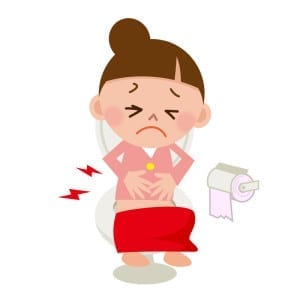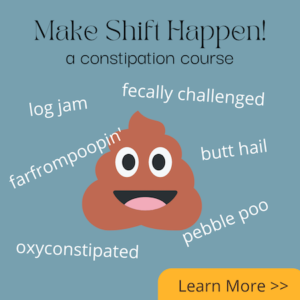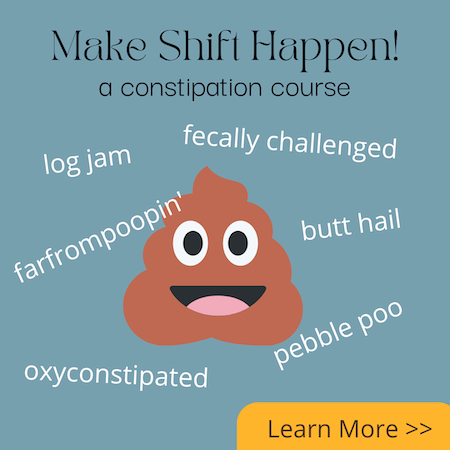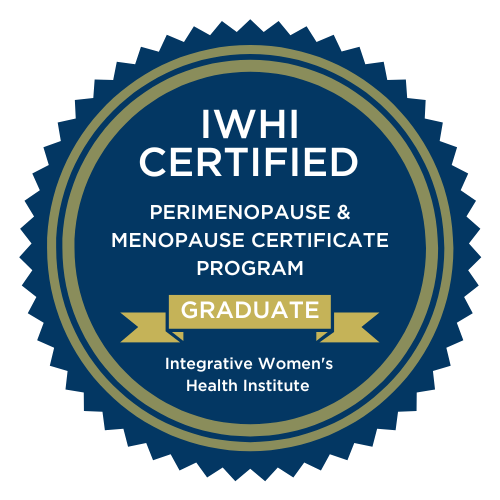
Constipation, also known as “farfrompoopin” in German, may have many contributing factors. As anyone who suffers from chronic constipation can tell you, it’s no laughing matter. I’ve been there! In my late teens, I went through a stage when I pooped about once a week! I suffered from headaches, bloating and moodiness. At the time, I lived on a diet of processed foods. Combine that with birth control pills messing up my gut flora and me being too cool to walk everywhere once I got a car, it’s no wonder I was constipated! Now in my 40’s I thank my colon every single day. I love my rectal stretch receptors! Okay, I realize that sounds a little weird, but what I mean is that I appreciate the pure genius of the human body. Without the rectal stretch receptors, you would never get the signal to go and poo would just sit there and dry out. And then you would be super cranky and start smashing things.
There may be many reasons for constipation. I cover several of the contributing factors in this post, many of which you may have never heard of. For constipation in children click HERE.
Fiber: I know, I know, you’ve heard this one before, but it’s important to mention again. Ideally, we should be eating between 30-50 grams of fiber a day, but the average American eats only 8 grams of fiber a day! If you’re constipated and your poo resembles pebbles (aka kibbles and bits) you may need more fiber in your diet. Fiber ferments in the colon and forms a fatty acid glue-like substance that holds your poo together. I recommend getting your fiber from whole foods such as fruits (berries are high fiber), vegetables, nuts, seeds, and beans. The thing about fiber supplements like phylum husks is that they can have the opposite effect and can clog the colon if you take too much or are not drinking enough water.
Water: The human body consists of about 65% water. We use way more water than we take in, so the body recycles the water from our colons. Water is needed for bile, gastric juice, and saliva production (we produce between 1-2 liters of saliva a day!) Water also transports waste, toxins, and nutrients. If we don’t have adequate water, our stools become dry and hard to pass.
Hypothyroidism: Hypothyroidism can weaken the peristaltic (wavelike movement) contractions of the large and small intestines causing constipation. Recommended tests are TSH, Free T4, Free T3, Reverse T3, and thyroid antibodies. Have your test results evaluated by a functional nutritionist or ND.
Neurological conditions such as Parkinson’s disease or multiple sclerosis may also cause constipation.
Sitting too much: I remember one client who suffered from chronic constipation and bloating. She had a fabulous diet, did her self-care massage and received Visceral Manipulation™ treatments from me. Her bowel movements improved after her treatments but by mid-week, she was bloated and constipated again. I kept nagging her about the fact that she sat all day at her desk and then sat on her commute and then again at home to relax. She always countered with “But I exercise!” She went for a 30-minute walk after work and did an exercise DVD three times a week. I told her an hour of exercise doesn’t replace 10 hours of sitting! I finally convinced her to transition to a sit/stand workstation, where she could stand part of the day while doing her Restorative Exercise™. I also demonstrated how sitting on her sacrum could contribute to her organ slow down. The week she made the transition is the week her constipation and bloating symptoms improved drastically.
Sucking in the belly: Sucking in your belly interferes with your organs natural motility and mobility, and may lead to a weak core and pelvic floor.
Being rushed: Give yourself a little extra time in the morning. Enjoy that early morning silence with a cup of tea.
Ignoring the urge: The rectum contains stretch receptors that signal when it’s time to find a bathroom. If you ignore the signal, water gets pulled out on the colon and the stool dries out and becomes harder to expel. If you chronically ignore the urge to go, you could shut down your natural urge to go and may even overstretch areas of your colon affecting its tone. So, if the gopher is trying to poke his head out of the hole, let the poor thing out. The only time you should resist the urge is when you’re in a life-threatening situation… like when the building is on fire. Ignoring the call of nature can also lead to anal sphincter dysfunction.
Anal sphincter dysfunction: This is usually related to the bathroom averse crowd or those who ignore the urge to go because they are too busy to stop what they’re doing. If you routinely ignore the urge to go, you may develop what is called paradoxical sphincter contraction. “You’re pushing on the door at the same time you’re holding it shut. …You can figure these folks really easy. You stick your finger in their rectum and you go, ‘Okay, push,’ and you feel them clamp down.”- from Gulp: Adventures on the Alimentary Canal by Mary Roach. BTW, that was a quote from a physician, that’s why he has experience sticking fingers in rectums.
A tight pelvic floor is along the same lines as the anal sphincter dysfunction. If your puborectalis muscle (part of the pelvic floor) is unable to relax, it will put a kink in your poop shoot (rectum). Causes of a too tight pelvic floor may include, chronic stress, wearing shoes with positive heels, spending the bulk of the day sitting, tight hamstrings, Kegels and posteriorly tilted pelvis. The pelvic floor doesn’t work in isolation, the whole body works as a team.
Not eating enough: When we eat a meal, it stimulates the gastrocolic reflex and pushes the previous meal toward the rectum. The poop has to have enough volume to stimulate the motility of the colon as well as the stretch receptors. The smaller the poo the more exerting is needed.
Eating disorders: Eating disorders have a detrimental effect on the digestive system. In severe cases, the colon’s motility is greatly reduced.
Laxative abuse: The enteric nerve cells disappear in people who abuse laxatives.-The Second Brain: A Groundbreaking New Understanding of Nervous Disorders of the Stomach and Intestine Read what Dr. Mariotti has to say about gut healing, click here (there is hope).
Stagnant Liver: According to Chinese medicine excess heat in the liver and stagnancy is considered excess type constipation. Read my Hemorrhoid/liver post HERE and my Chinese medicine Liver post HERE.
Abdominal adhesions: infection, injury, or surgery can cause adhesions that can interfere with organ motility. Visceral Manipulation™ works to reduce abdominal restrictions and increase mobility and motility of the internal organs. read more about how I work with abdominal adhesions HERE and how you can work with your own abdominal adhesions HERE.
Retroverted Uterus A retroverted uterus (tipped back) can push against the rectum, depending on the degree of retroversion. This may contribute to constipation or thinner stools especially right before your period when the uterus is heavier. Read more about retroverted uteri HERE.
Gut To Brain Axis Disorder is when the brain to the gut pathway isn’t firing correctly.
An online course for relieving constipation!
Learn abdominal massage and other remedies for constipation! If you would like to learn how to do abdominal massage for constipation from an abdominal massage expert, this course is for you. This constipation course goes beyond general massage for constipation. You will learn specific massage techniques for each area of your colon as well as small intestine massage. You will also learn nutritional (beyond just eating more fiber), herbal, exercises, and other remedies to relieve constipation, gas, and bloating.

Opioid use. In this study, they found “The abdominal massage application increased the number of defecations by 13% and was an effective approach for managing opioid-induced constipation symptoms.”
Constipation typically originates on the left side of the colon. Constipation in the sigmoid portion of the colon can be felt by palpating the lower left quadrant of the belly. If you feel a hard sausage slightly to the right of the inside of your left pelvis, say hi to your next poop. In some cases, constipation can originate on the right in the cecum. Right-sided constipation doesn’t happen as much because the stool is still in its liquid-like form. As the stool moves through the colon water is reabsorbed into the body and the poop gets firmer.
SIBO Small intestinal bacterial overgrowth (SIBO) can also cause constipation (and diarrhea) and sometimes can get worse with fiber intake. It’s best to get tested if you suspect SIBO and work with a Functional Nutritionist or ND who is experienced with SIBO and rebalancing gut flora.
“I will say also that in my experience and from my reading of the scientific literature, chronic constipation is almost always caused by intestinal dysbiosis, so an imbalance of good and bad bacteria in the gut. And in particular, it’s often caused by a lack of bifidobacteria in the large intestine. There’s a strong association between low levels of bifido and constipation. I talked about that in my gut-brain-skin axis presentation at the Weston A. Price Foundation, the Wise Traditions Conference that I spoke at recently. So, magnesium glycinate can be helpful in the transition period while you’re healing your gut and even long term, because a lot of people, as I’ve said before, don’t get enough magnesium through the diet even in the context of a healthy diet. But I wouldn’t only do that. I would be focusing on gut dysbiosis, and you can get the organic acids Organix Dysbiosis test to see if there’s SIBO or dysbiosis. I would also do a stool profile to make sure there are no pathogens, like parasites or bacteria or yeast, that can be contributing because that’s often a player in constipation.” Chris Kresser. Read the full article here.
Antibiotics and some medications Antibiotics, birth control pills, and NSAIDS can disrupt the gut flora balance and cause constipation. Other drugs that can interfere with colon motility are pain meds (for example, Tylenol 3, Percocet, Dilaudid), antidepressants (Elavil, Endep, Tofranil), some iron supplements, antacids, and anticonvulsants. Read your informational leaflet!







